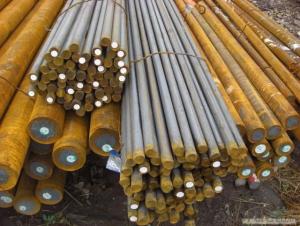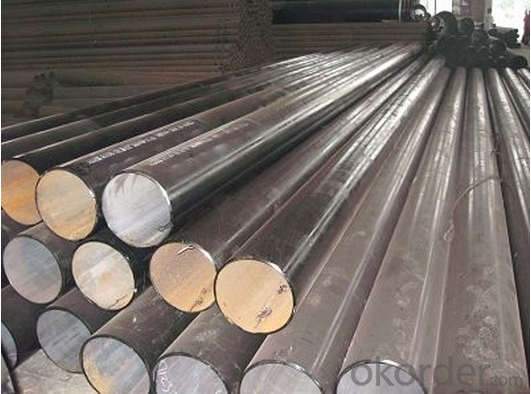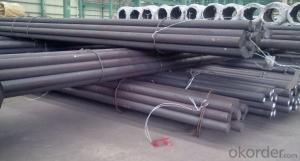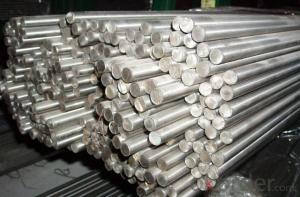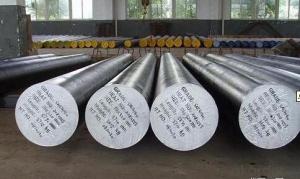SAE 1065 Alloy Steel Rounds Bar of CNBM
- Loading Port:
- Shanghai
- Payment Terms:
- TT or LC
- Min Order Qty:
- 25 m.t.
- Supply Capability:
- 50000 m.t./month
OKorder Service Pledge
OKorder Financial Service
You Might Also Like
Specification
AISI 1065 Carbon Steel Round Bar
Product Description:
1. Sizes: Diameter: 16mm-300mm; Length: 6m, 9m, 12m
2. Grade: AISI1065
3. Invoicing on theoretical weight or actual weight as customer’s request
4. Shape: Round bar, solid bar of steel with circular section
5. Technique: Hot rolled, forged, cold rolled
Specifications
Material | AISI 1065 | Round bar | Dia(mm) | Max 700 |
Process | EAF + LF + VD + Forged + Heat Treatment (optional) | Length (mm) | Max 12000 | |
Heat treatment | Normalized / Annealed / Quenched / tempered | Plate bar | Thickness(mm) | Max 200 |
Delivery condition | Hot forged +Rough machined (black surface after Q/T)+ Turned (optional) | Width(mm) | Max 3000 | |
Test | Ultrasonic test according to SEP 1921-84 D/d | Length (mm) | Max 12000 |
Chemical Composition
Standards: ASTM,JIS,GB,EN(DIN,BS,NF)
Grade | C | Si | Mn | Cr | Ni | Cu |
AISI 1055 | 0.62~0.70 | 0.17~0.37 | 0.50~0.80 | ≤0.25 | ≤0.30 | ≤0.25 |
Delivery condition
EAF+LF+VD+(ESR), rolled / forged, annealed / Q+T, black/peeled/turned, UT tested
Application
Carbon steel rod applies to chemical industry, shipping industry,manufacturing industry, construction, decorate industry, electric power, pump shafts, sanitary wares, furniture handles, boiler, high temperature resistant,low temperature resistant,corrosion resistant
Sales Information
Material | High Quality Carbon Structural Steel 1055 |
Size | Diameter:10-700mm Length:6000mm-12000mm |
Origin place | Made In China |
Delivery Condition | Hot rolled, cold drawn, forged |
Surface require | Black, grinding, bright, polish |
Heat treatment | Quenched, Tempered, annealed |
Packing | Seaworthy packing ,wooden case ,carton,woven bag or at client's requires |
Delivery time | According to order’s quantity. |
Trade Term | EXW,FOB,CIF |
Payments | T/T or L/C at sight |
Port | China main Port, such as shanghai, Dalian, Shenzhen port. |
MOQ | 1 Metric Ton |
Product show:
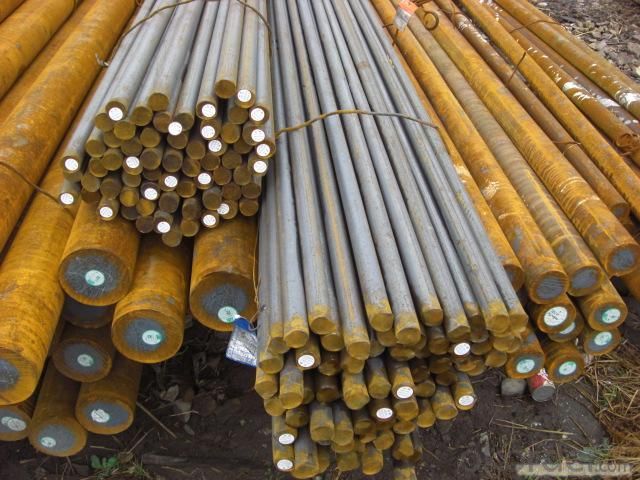
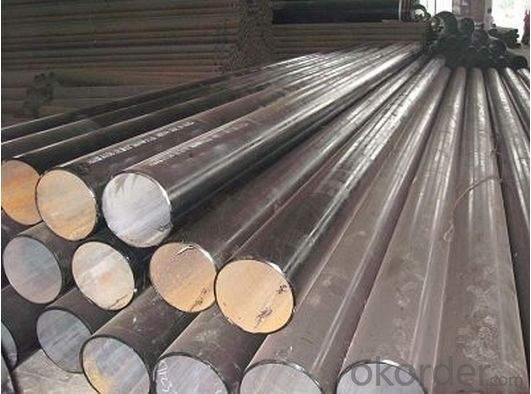
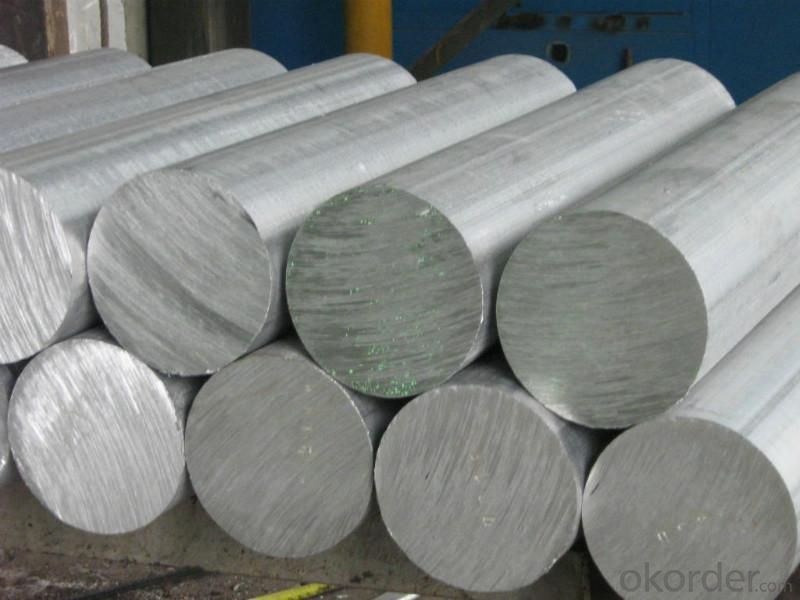
- Q: What are the different surface finishing methods used for special steel?
- There are several surface finishing methods used for special steel, including electroplating, powder coating, anodizing, painting, and passivation. These methods are employed to enhance the appearance, corrosion resistance, durability, and overall performance of the steel.
- Q: What are the different heat treatment techniques used for special steel?
- There are several heat treatment techniques used for special steel, including annealing, quenching and tempering, case hardening, and precipitation hardening. Each technique is designed to enhance specific properties of the steel, such as hardness, toughness, and durability, depending on the intended application.
- Q: What are the requirements for special steel used in automotive parts manufacturing?
- The requirements for special steel used in automotive parts manufacturing are specific and crucial to ensure superior performance, safety, and durability of the vehicles. Here are some of the key requirements for special steel used in automotive parts manufacturing: 1. Strength and Hardness: Special steel used in automotive parts needs to have high strength and hardness to withstand the extreme stresses and loads that automotive components experience. This ensures the parts can endure heavy usage, resist deformation, and prevent failure under demanding conditions. 2. Ductility and Toughness: While being strong and hard, special steel must also possess good ductility and toughness. Ductility allows the steel to be formed and shaped into various intricate automotive parts, while toughness ensures that the parts can absorb energy and resist fracture or cracking upon impact. 3. Corrosion Resistance: Automotive parts are constantly exposed to various environmental conditions, including moisture, humidity, and road salts. Special steel used in automotive parts must exhibit excellent corrosion resistance to prevent rust and deterioration, thereby increasing the longevity and reliability of the parts. 4. Weldability: As automotive parts are often assembled through welding processes, it is essential for special steel to have good weldability. This allows for efficient and secure joining of different components, ensuring structural integrity and minimizing the risk of weld defects. 5. Heat Resistance: Special steel used in automotive parts manufacturing should have sufficient heat resistance to withstand high temperatures generated during engine operation, friction, or other thermal processes. This ensures that the steel maintains its mechanical properties even under extreme heat conditions, preventing premature failure or deformation. 6. Fatigue Strength: Automotive parts are subjected to repeated loading and unloading cycles, leading to fatigue failure if the steel does not have adequate fatigue strength. Special steel should possess high fatigue strength to withstand cyclic loading and resist fatigue cracks, enhancing the durability and reliability of the parts. 7. Dimensional Stability: Automotive parts need to maintain their shape and dimensions over time to ensure proper fit and functionality. Special steel used in manufacturing should exhibit dimensional stability, minimizing any warping or distortion during heat treatment or operational conditions. 8. Cost-effectiveness: While meeting the above requirements, special steel should also be cost-effective for automotive parts manufacturing. This means that the steel should be reasonably priced, readily available, and offer a good balance between cost and performance. Meeting these requirements is crucial for manufacturers to produce high-quality automotive parts that meet industry standards, perform optimally, and contribute to the overall safety and performance of vehicles.
- Q: How is spring steel used in the automotive industry?
- Spring steel is used in the automotive industry primarily for manufacturing suspension systems, including coil and leaf springs. It offers excellent elasticity, durability, and resistance to deformation, allowing it to absorb shocks and provide a smoother ride. Additionally, spring steel is also utilized in various automotive components such as clamps, brackets, and fasteners due to its high strength and corrosion resistance properties.
- Q: How does nitriding improve the wear resistance of special steel?
- The wear resistance of special steel is greatly enhanced through the process of nitriding, which involves infusing nitrogen atoms into the steel's surface to create a hardened layer known as nitride. This nitride layer is extremely tough and can withstand abrasive forces and friction, thereby increasing the steel's durability. The enhanced wear resistance of nitrided special steel can be attributed primarily to the formation of iron nitride (Fe3N) within the nitride layer. Iron nitride possesses a high level of hardness, typically ranging from 800 to 1000 HV (Vickers hardness), which is significantly greater than the hardness of the steel's base material. This contributes to the improved wear resistance. Moreover, the nitride layer formed during nitriding also augments the surface hardness of the steel, rendering it more resistant to deformation and indentation, which are common causes of wear in materials subjected to friction and abrasion. In addition, the nitride layer acts as a protective barrier, safeguarding the underlying steel against chemical reactions, oxidation, and corrosion. This barrier prevents the steel from deteriorating when exposed to harsh environments, moisture, and chemicals, thereby further enhancing its wear resistance. Ultimately, the process of nitriding enhances the wear resistance of special steel by creating a hardened nitride layer that is both exceptionally hard and resistant to wear, while also serving as a protective barrier. Consequently, the lifespan and durability of the steel are significantly prolonged, making it an ideal choice for applications that require high wear resistance, such as cutting tools, gears, and automotive components.
- Q: What are the applications of special steel in the power generation manufacturing process?
- Special steel has various applications in the power generation manufacturing process, including the production of turbine components, boiler tubes, and heat exchangers. The high strength and corrosion resistance properties of special steel make it suitable for withstanding extreme temperatures and pressures, thereby ensuring the efficiency and reliability of power generation equipment. Additionally, special steel alloys are used in the construction of power plant structures, such as transmission towers and support systems, due to their durability and ability to withstand harsh environmental conditions.
- Q: How does special steel contribute to reducing product weight?
- Special steel contributes to reducing product weight through its unique properties. Special steel is known for its high strength-to-weight ratio, which means it can provide the same level of strength and durability as other materials while being significantly lighter. By using special steel in the manufacturing process, products can be designed with thinner and lighter components without compromising their structural integrity. This reduction in weight not only makes the product more portable and easier to handle, but it also helps in reducing transportation costs and improving fuel efficiency in industries such as automotive and aerospace.
- Q: What are the environmental benefits of using special steel?
- Special steel, also known as alloy steel, offers several environmental benefits. Firstly, it has a longer lifespan compared to conventional steel, reducing the need for frequent replacements and minimizing the associated resource consumption and waste generation. Secondly, special steel is often manufactured using recycled materials, thereby reducing the demand for new raw materials and the energy required for extraction and processing. Additionally, its high strength and durability enable the production of lighter structures and components, leading to lower transportation and fuel consumption. Lastly, special steel can be recycled at the end of its life, further reducing waste and the environmental impact associated with its disposal.
- Q: What are the different non-destructive evaluation techniques used for special steel?
- Some different non-destructive evaluation techniques used for special steel include ultrasonic testing, magnetic particle inspection, dye penetrant inspection, eddy current testing, and radiographic testing. These methods allow for the detection of internal and surface defects in the steel without causing any damage to the material.
- Q: What are the different shot blasting techniques used for special steel?
- Some of the different shot blasting techniques used for special steel include wheel blasting, air blasting, and wet blasting. Wheel blasting involves using a high-speed rotating wheel to propel steel shot at the surface of the steel, removing any contaminants or rust. Air blasting uses compressed air to propel abrasive particles at high speed onto the surface of the steel, achieving a similar result. Wet blasting combines water with the abrasive particles to create a slurry, which is then sprayed onto the steel surface to remove any impurities effectively. These techniques are commonly employed to prepare special steel for further processing or to enhance its surface finish.
Send your message to us
SAE 1065 Alloy Steel Rounds Bar of CNBM
- Loading Port:
- Shanghai
- Payment Terms:
- TT or LC
- Min Order Qty:
- 25 m.t.
- Supply Capability:
- 50000 m.t./month
OKorder Service Pledge
OKorder Financial Service
Similar products
Hot products
Hot Searches
Related keywords
